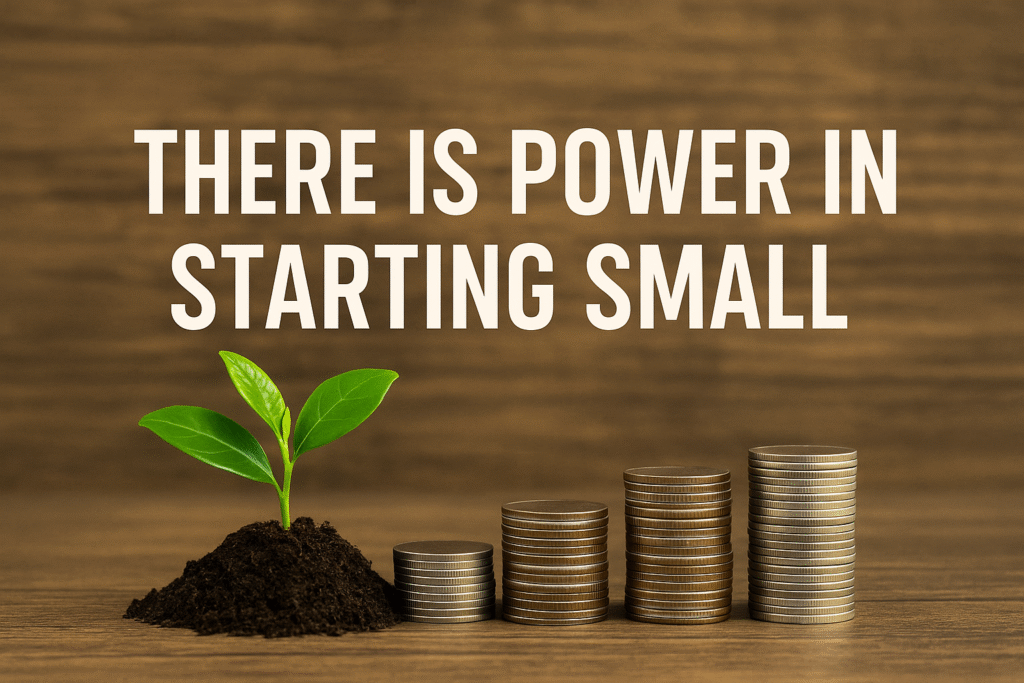
There Is Power in Starting Small: Why Big Dreams Don’t All The Time Need Big Beginnings
In a world where social media highlights instant success and “overnight millionaires,” it’s easy to feel like you’re already behind if your business, finances, or life goals aren’t booming right now. But the truth is: there is power in starting small. Not only is it okay to begin with little, it’s often the best way to build something that lasts.
Starting Small Isn’t Failure—It’s Strategy
Starting small does not mean you’ve failed or that you lack ambition. In fact, it’s a strategic move used by some of the most successful companies and people in history. Facebook began as a project in a Harvard dorm room. Apple was started in a garage. Even Amazon’s original office was just a small room with a desk made from a door.What these stories have in common is not just small beginnings, but humble consistency. The founders started with what they had, refined their ideas, and scaled over time. They didn’t wait for perfect conditions or massive funding—they moved forward anyway.
Why Small Starts Make Big Sense
Let’s explore why starting small is not only valid—it’s often the smartest choice, especially in your financial and business journey:
- 1. Less Risk, More Flexibility:Starting with a small budget or team allows you to test ideas without risking everything. If it fails, you can pivot fast. If it works, you can scale wisely.
- 2. Build Habits First:Wealth is built on habits, not hype. Starting small gives you time to develop discipline—budgeting, saving, investing, managing time, or leading a team. These habits form the foundation for long-term success.
- 3. Room to Learn:When you start small, you can afford to make mistakes. Early failures aren’t fatal—they’re lessons. You gain experience at a pace you can handle without being crushed by pressure or public scrutiny. It allows budgeting for business less capital intensive and stressful while giving you experience
- Focused Growth:A smaller scale forces you to focus on what matters—your message, your audience, your product. It sharpens your vision and builds character. When you finally scale, you’ll be grounded and clear.
Small Starts in Personal Finance
In your personal finance journey, starting small might look like:Saving ₦5000 a month instead of ₦50,000.Investing just ₦2000 weekly into a mutual fund or digital asset.Paying off one debt at a time.Creating a side hustle while keeping your 9–5.
Many people get discouraged because they can’t “go big” from the beginning. But consistency beats intensity. A small, regular saving habit will outperform random big deposits over time.
The Upward Habits Way
At Upward Habits, we believe in the slow, steady, upward climb. Our message is clear: “Self-Discipline,Purpose, and Financial Leveling Up.”
Starting small aligns with all three: You build routines that carry you through hard seasons:
- Self-Discipline: You build routines that carry you through hard seasons.
- Purpose: You don’t chase hype—you follow your path.
- Finance: You plant finicial seeds now for a harvest later.
Wealth, whether in business or personal life, grows like a tree. You don’t see results the first week. But if you stay committed, nurture your skills, and remain consistent, the results will come—and they will be massive.
Don’t Wait. Just Start.
Maybe you’re thinking, “I don’t have enough time, money, support, or knowledge.” That’s okay. Start anyway. Start with what you have—right now. A small blog, a mini savings account, a short ebook, a 2-product online store, a ₦1000 investment. Start where you are.It’s not about going viral—it’s about going vital. Build the core. Master the process. Growth will follow.
Final Thought
Don’t despise small beginnings. Don’t let the pressure of “looking successful” keep you from becoming successful. Every big thing you admire once had a day one. Today can be yours.
Start small. Stay consistent. Think long.That’s how upward habits create upward wealth.